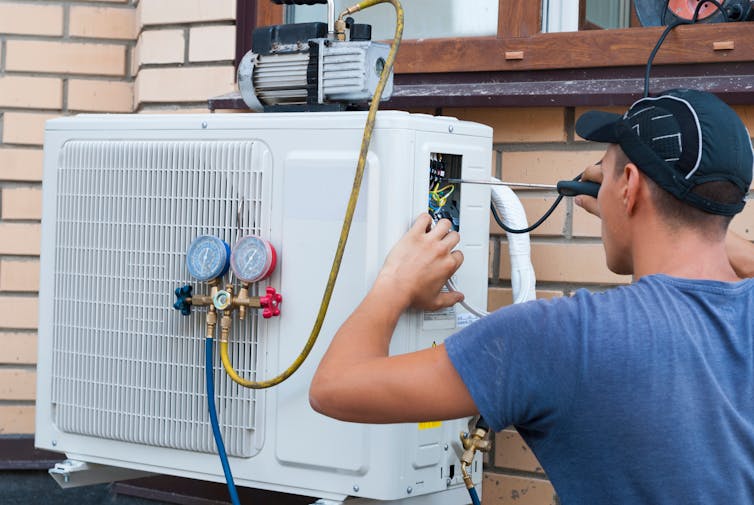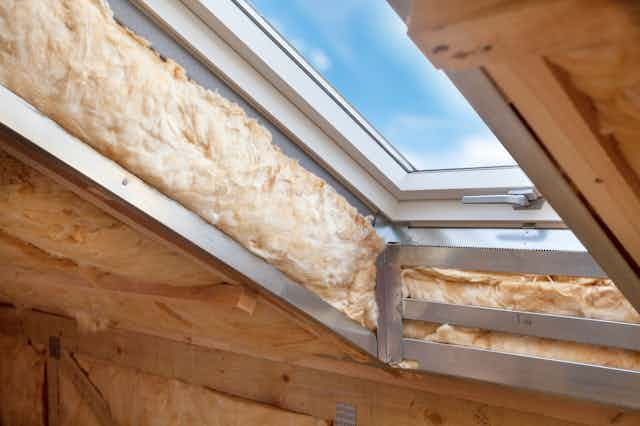Making homes and buildings energy efficient is a win-win for people and the planet. Homes with well-insulated walls and windows need to burn less gas in a boiler to keep warm, reducing household greenhouse gas emissions and energy bills.
In a new analysis from the Centre for Energy Policy at the University of Strathclyde, we found that a nationwide drive to retrofit homes with more insulation could even benefit the economic recovery from COVID-19.
We used a model that considers how different parts of the economy – including the construction and retail trade sectors – interact, to understand the consequences of £69billion (US$94.7 billion) worth of energy efficiency improvements over 15 years.
A programme of this size would enable all households to reach an Energy Performance Certificate C rating by 2035 – a key government target and an essential part of making homes easier to heat. This would raise the average energy efficiency of the country’s housing stock by just over 10%.
The UK’s buildings account for 17% of the country’s greenhouse gas emissions. Making them more energy efficient could cover 34% of the emission cuts needed in the sector by 2030. It would also increase GDP by nearly £1.3 billion (0.07%) a year, and create 22,545 new full-time jobs across the UK economy. At the peak of renovations, the programme could need up to 137,000 skilled workers.
Another recent study modelled the economic benefits of combining a nationwide energy efficiency drive with a programme to replace 900,000 gas boilers a year (or other forms of heating which burn fossil fuels) with electric heat pumps in homes by 2028. The analysis suggested that this could create 138,600 new jobs and provide a £9.8 billion boost to the economy by 2030. Even the government’s less ambitious plans to install 600,000 heat pumps a year by 2028 would still generate £3.9 billion and provide 71,500 new jobs by 2030.

A home energy efficiency drive would boost household incomes by lowering bills, triggering a sustained expansion of the economy, with the real driver being the level of spending power freed up. Lower income households could expect to gain £100 a year, while those on higher incomes could receive an extra £270 annually. Higher income groups typically consume more energy, and so will see greater savings once measures are installed.
Replacing the green homes grant
The UK government launched the green homes grant in September 2020 – a £1.5billion scheme which offered to cover two-thirds of the costs of a household’s chosen energy efficiency improvements, with a maximum contribution of £5,000. It covered all costs up to £10,000 for households on certain benefits.
The scheme was criticised for administrative blunders, with reports of red tape and misleading advice preventing households from accessing it. The green homes grant was closed early in March 2021.
Replacing it with a large-scale energy efficiency programme could boost economic growth, but the way it is funded is pivotal. Forcing households to pay or take on debt to fund these improvements would limit the benefits to GDP and employment. Our analysis suggests that the government could make greater gains by running a budget deficit, through borrowing or minting new funds.
The UK is also experiencing labour shortages across a range of sectors, and reporting a growth in average pay of 7.4%. Assuming that there is a limit to the amount of skilled workers available, the programme could drive up wages as the sector grows, triggering a wider economic expansion.

A rise in wages in specific sectors can lead to an increase in the prices of goods and services across the economy, so it’s also important for the government to plan for how activity in new and growing sectors might affect wages and the cost of living across the economy more generally.
The level of confidence that businesses within the retrofitting supply chain have in the long-term prospects of the programme can lead to lower costs of installing measures, too. Our analysis suggests that steady government support would ultimately deliver stronger economic benefits.
So a bold energy efficiency programme could benefit the economy and the environment, but only with significant investment and sustained political will.

